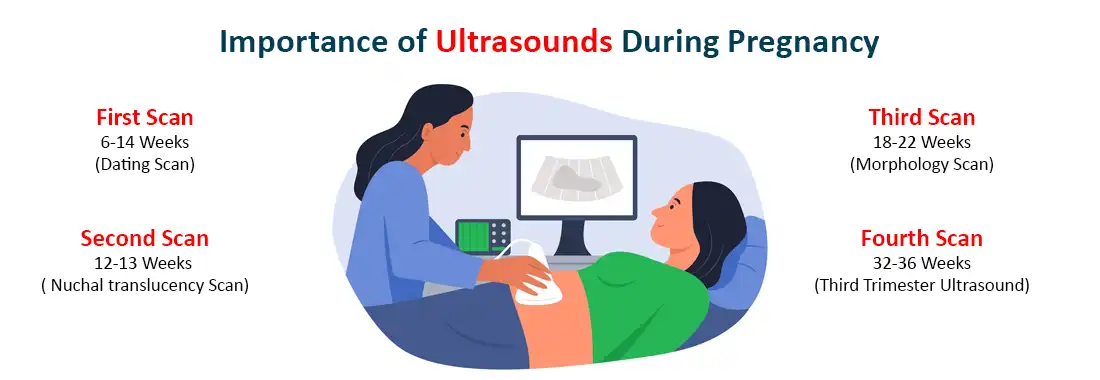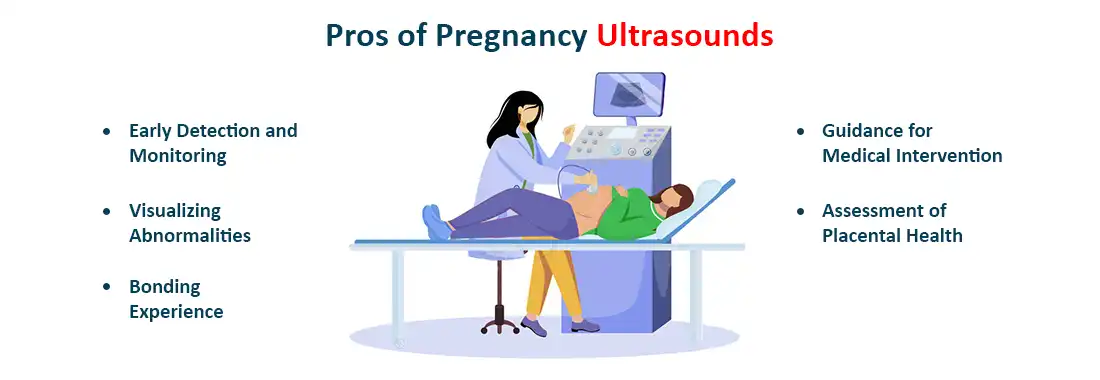
A pregnancy is a crucial time for every woman. But it can be stressful. A woman and her family all focus on the health of a woman and baby. It is essential to give your baby a healthy start in life.
A pregnancy is a crucial time for every woman. But it can be stressful. A woman and her family all focus on the health of a woman and baby. It is essential to give your baby a healthy start in life.
In the start of the pregnancy it feels unreal. There are a lot of questions in mind like How do you know you are pregnant, when you are unable to see it, or when will the baby start moving?
Ultrasound in pregnancy provides painless diagnostic tests. The ultrasound doctor will examine the growth of the foetus movement, heartbeat, breathing, and the mothers placenta, uterus and the amount of amniotic fluid surrounding your baby.
These harmless imaging techniques offer invaluable information insights into the pregnancy journey, but they also come with their set of advantages and limitations.
Diagnostic Uses of Ultrasound in Pregnancy
Ultrasound is used to examine the developing foetus, uterus and placenta and detect the foetal and uterine/placental development.
Ultrasound imaging is used to assess the following:
Confirm the Pregnancy
Detecting the gestational age, which is important to measure the development of a baby against the well-established growth charts to ensure normal development.
Evaluate the multiple pregnancies (twins, triplets etc)
During the pregnancy it's important to detect the placenta position within the uterus which is very important for both health of a baby and mother.
Detects the foetal position which is important during delivery.
Evaluate presence of congenital anomalies or genetic abnormalities. It is crucial to the new parents to know if they have any family history. So that they can terminate the pregnancy.
Monitor the Growth of a Baby
Monitor the amniotic fluid because it is harmful to the baby if it is too little or too much. Any hamper in the amount of amniotic fluid may be indicative of problems with pregnant women that require immediate treatment.
Helping in test procedure like amniocentesis
Types of Ultrasound
- Transvaginal Ultrasound
- 3-D Ultrasound
- 4-D Ultrasound
- Fetal Echocardiography
Commonly transvaginal ultrasound is done which provides clear images for diagnostic purposes
3-D and 4-D ultrasound helps the gynaecologist to detect the width, height and depth of the foetus and organs. It helps in assessing the foetus more accurately. Best form of ultrasound to diagnose the congenital heart defects.
Uses of Ultrasound After Delivery
Ultrasound is also used to detect the problems that may occur after delivery.
Like brain haemorrhage for further evaluation CT and MRI can be recommended by the doctor.
How Many Ultrasounds Do Pregnant Women Need During Pregnancy?
During pregnancy , a pregnant woman can undergo 3-4 scans. But numbers may vary depending on the factors and like if a doctor suspected something or wanted to know underlying health conditions.

First Scan
6-14 Weeks (Dating Scan)
The dating scan is the term for the ultrasound that is done in the first trimester, or the early stages of pregnancy, typically between 6 and 14 weeks. This pregnancy ultrasound is used by your doctor to:
- To confirm the pregnancy
- To estimate due date of baby’s
- To detect the multiple pregnancies
- To monitor the growth of a baby
- To detect the ectopic pregnancy
- Evaluate the complications that may affect the mother or baby in the future
Second Scan
12-13 Weeks ( Nuchal translucency Scan)
The nuchal fold, a skin fold at the back of the neck that stores fluid, is present in every unborn child. Certain genetic conditions cause the nuchal fold to thicken and babies to have more fluid than usual.
This fold is measured by an NT scan to determine the likelihood of genetic disorders such as:
- Down syndrome
- Turner syndrome
- Trisomy 13 and 18
- Congenital heart disease
Third Scan
18-22 Weeks (Morphology Scan)
- Thor ultrasound scan is done between 18-22 weeks to detect the baby’s growths.
- This ultrasound is done to detect the following conditions.
- To examine the baby's internal organs like heart, kidney, liver etc.
- To detect the gestational age and baby's size.
- To monitor the baby’s heart rate and rhythm as well as examine the placenta.
- Measures the length h of the cervix of a women.
Fourth Scan
32-36 Weeks (Third Trimester Ultrasound)
During last trimester of pregnancy ultrasound is done to detect the following things:
- To detect the growth and position of the baby.
- Examine the amount of amniotic fluid.
- Detect the location of placenta.
- Examine the potential problems such as low foetal weight, congenital abnormalities or issues with umbilical cord.
Pros of Pregnancy Ultrasounds

- Early Detection and Monitoring: Ultrasounds allow early detection of pregnancy, confirming the presence of an embryo and estimating gestational age. They also help monitor foetal growth and development throughout the trimesters.
- Visualising Abnormalities: These scans aid in identifying any potential abnormalities or complications, empowering medical professionals to take necessary actions for management or treatment.
- Bonding Experience: For expectant parents, ultrasounds provide an emotional connection by offering glimpses of the growing baby, fostering bonding and anticipation.
- Guidance for Medical Intervention: Ultrasounds guide medical procedures like amniocentesis or chorionic villus sampling, assisting in diagnosing genetic conditions or other foetal health concerns.
- Assessment of Placental Health: They help evaluate the health and placement of the placenta, crucial for a healthy pregnancy and childbirth.
Cons of Pregnancy Ultrasounds

- Potential Overuse: Excessive use of ultrasounds, especially for non-medical reasons or as entertainment, raises concerns about potential risks associated with increased exposure to ultrasound waves.
- Limited Accuracy: While ultrasounds offer valuable information, they might not always provide a comprehensive view. Certain conditions or abnormalities might not be detectable through standard ultrasound imaging.
- Anxiety and False Alarms: Sometimes, inconclusive or ambiguous findings during ultrasounds can cause unnecessary stress and anxiety for expectant parents. False positives or unclear results may lead to further unnecessary testing or interventions.
- Dependency on Operator Skill: The quality and interpretation of ultrasound results heavily rely on the expertise of the technician or sonographer conducting the procedure, which may lead to variations in accuracy.
- Potential Heating Effect: Although studies show no adverse effects at diagnostic levels, concerns exist regarding the potential heating effect of ultrasound waves on foetal tissues, especially with prolonged exposure.
In conclusion, pregnancy ultrasounds play a crucial role in monitoring and ensuring the well-being of both the mother and the growing baby. While they offer numerous benefits by providing valuable information, it's essential to use them judiciously, considering both their advantages and limitations, and always under the guidance of qualified healthcare professionals.
Remember, each pregnancy is unique, and decisions regarding ultrasounds should be made in consultation with medical experts, prioritising the health and safety of both the mother and the unborn child.
The best diagnostic facility in Delhi for a pregnancy ultrasound or USG scan is Ganesh Diagnostic and Imaging Center (GDIC).
These days, Ganesh Diagnostic and Imaging Center is regarded as one of Delhi's most well-liked and reasonably priced diagnostic facilities. We offer our patients services of the highest caliber. Our main priorities are accurate reporting and patient satisfaction. We provide smooth integration of treatment planning and diagnosis.
Additionally, we offer a variety of pregnancy ultrasound scan options, such as
- Obstetrical Ultrasound
- TVS ultrasound
- Obstetrical Color Doppler ultrasound
- Level-2 ultrasound in pregnancy
- Fetal wellbeing ultrasound
- Ultrasound NT NB scan
- Ultrasound biophysical profile
- Ultrasound scan for Twins etc.
To book your appointment now. Click here!
Get the most affordable obstetric ultrasound in Delhi by making an appointment at Ganesh Diagnostic & Imaging Centre.
Frequently Asked Questions Related Ultrasound in Pregnancy
Which ultrasound is important in pregnancy?
Ultrasonography in the second trimester, carried out between weeks 18 and 20, is used to assess the growth of foetal structures, including the spine, limbs, brain, and internal organs. Additionally, the placenta's size and location are examined. If the parents are interested in knowing, they can find out the baby's sex.
How many ultrasounds are safe in pregnancy?
During pregnancy, the majority of healthy women get two ultrasound scans. The first is, ideally, in the first trimester to confirm the due date, and the second is at 18-22 weeks to confirm normal anatomy of the baby.
Which ultrasound gives the most accurate results?
The most reliable technique for determining or verifying gestation age during pregnancy is first-trimester ultrasound, or ultrasound performed before 13 weeks and 6/7 days. Transvaginal or transabdominal first-trimester ultrasound procedures are available.
What is the full form of USG?
USG stands for Ultrasound Sonography, it is a non-invasive imaging method that makes images of the body's internal structures using sound waves.
Which ultrasound is best for an ectopic pregnancy?
Transvaginal ultrasound is an ideal diagnostic technique for those who are pregnant. Place the patient in the supine lithotomy position, ideally on a pelvic exam-compatible stretcher (i.e., one that has stirrups). In both the long and short axial planes, scan the uterus.
What is the IVF ultrasonography test?
The growth of the tissue lining the inside of the uterus can also be monitored with an ultrasound. There is very little chance that the embryo will be implanted successfully if this tissue is not thick enough. When an embryo is being implanted in a patient's uterus during in vitro fertilisation, external ultrasounds are used.
How to diagnose twin pregnancies?
Ultrasound scan is the best way to diagnose twins as it is a non-invasive and safe procedure. Compared to a single pregnancy, physical changes during a twin pregnancy are more noticeable.
What is the price of an ultrasound scan during pregnancy in India?
Pregnancy-related ultrasound scans at our centres range in price from Rs. 1500 to Rs. 3000 depending on the type of scan.









